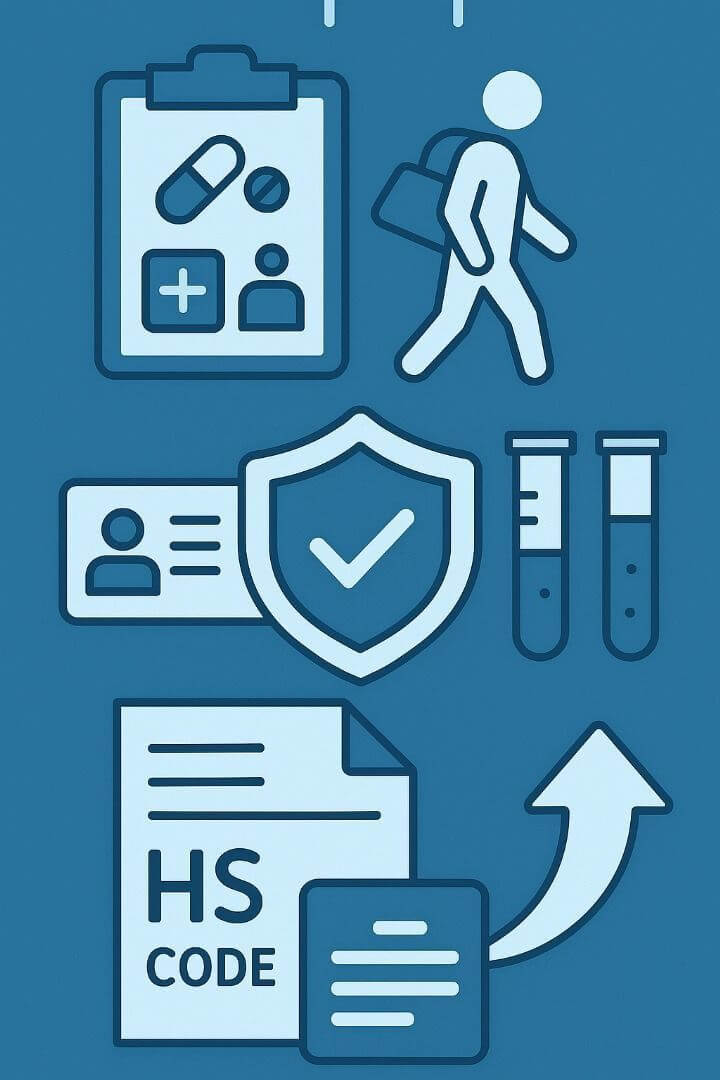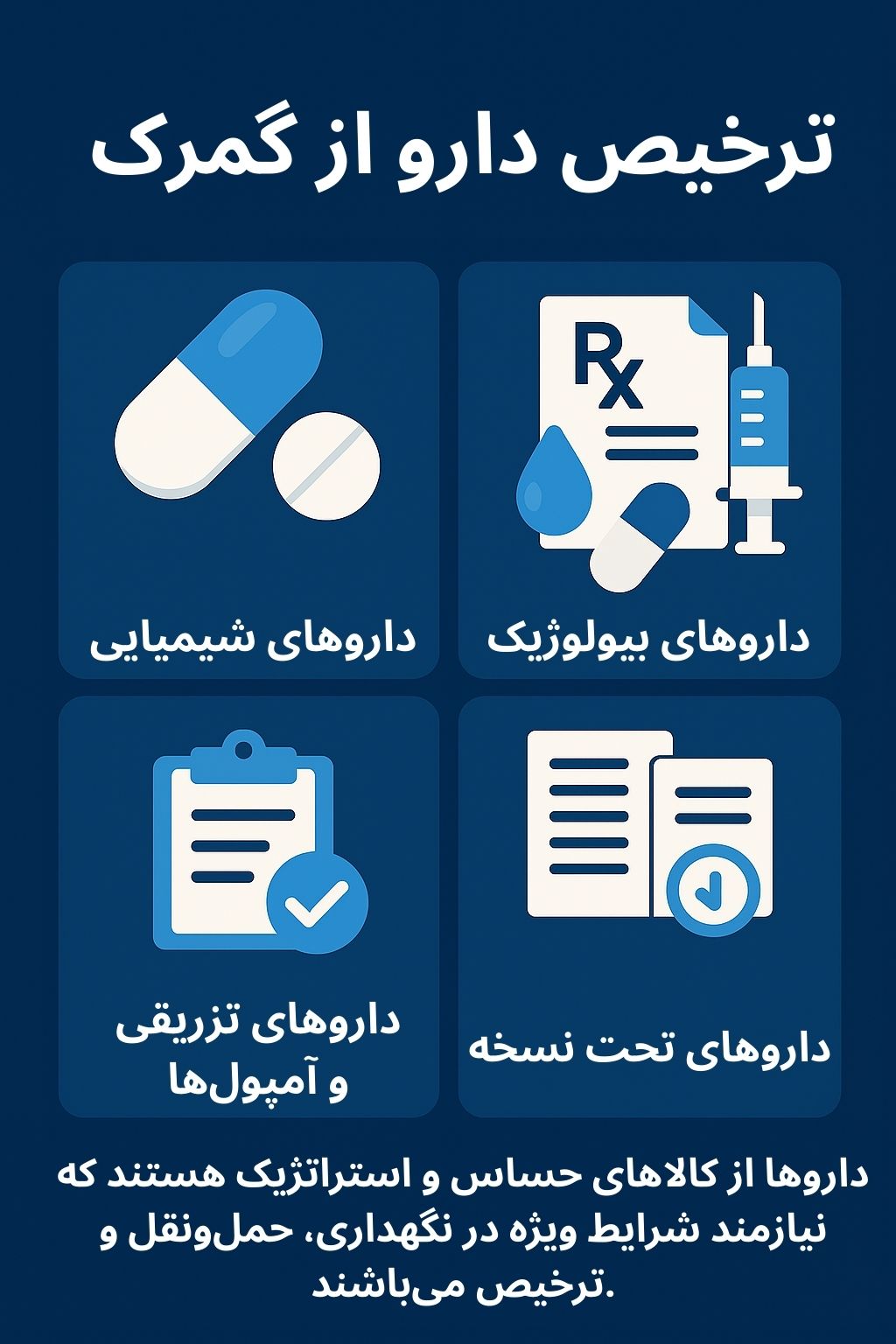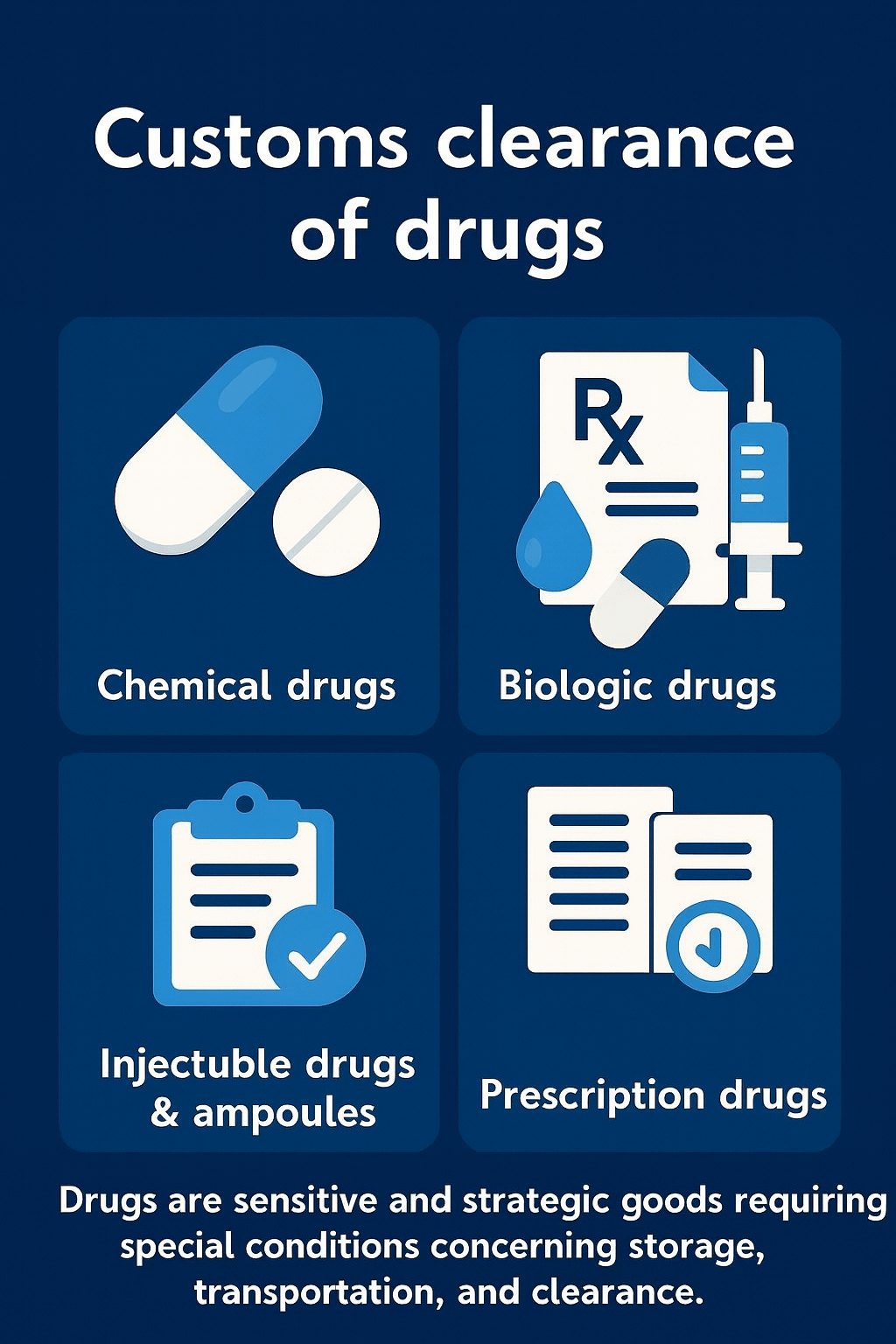Customs clearance of medicines
Customs clearance of medicines is one of the vital and complex processes in imports. Due to its direct link with public health, this process is subject to very strict regulations and oversight whose main goal is to ensure the quality, safety, and efficacy of imported drugs. Each medicine, depending on its type and composition, must comply with specific health standards and, to pass through customs, requires multiple legal documents and permits.
For an estimate of the time and cost of customs clearance of medicines, contact the experts at Saba Tarkhis.
Immediate free consultation
1) Detailed Description: The Nature and Sensitivity of Drug Clearance
Medicines are strategic, health-centric goods whose supply chain, storage, transport, and quality control must be performed under stringent conditions (temperature/humidity, cold chain, expiry date, batch number, etc.). Therefore, the drug clearance process is a combination of health, technical, documentary, and customs controls, and the slightest deficiency can lead to detention or destruction of the shipment.
2) Types and Uses: Common Pharmaceutical Categories
- Human pharmaceuticals: Treatment of human diseases in various forms (tablet, capsule, syrup, ampoule, etc.)
- Veterinary pharmaceuticals: Treatment of animal diseases, including antibiotics, vitamins, vaccines
- Herbal medicines and supplements: Natural products and nutritional/medical supplements
- Blood products and derivatives: Plasma and protein derivatives
- Biotechnology drugs: Advanced therapies for cancer/autoimmune diseases, etc.
3) Key Points in Customs Clearance of Medicines
Required Documents and Permits for Customs Clearance of Medicines
Import permit from the Food and Drug Administration (FDA Iran): This is the first and most important document you need for customs clearance of medicines. Iran’s Food and Drug Administration issues this permit after assessing the quality and safety of the drug. The organization is responsible for testing all imported medicines for efficacy, safety, and raw material quality. Without this permit, entry of any medicine into the country is prohibited.
Commercial Invoice: This invoice includes all details related to the imported shipment and provides precise information such as the type of drug, quantity, price, and full seller details. The commercial invoice is essential for determining customs tariffs and calculating import taxes.
Proforma Invoice: This preliminary invoice is prepared and sent by the seller before shipment and enables the importer to have exact details about the price and quantity of the drug. This document plays a key role in the initial stages of import and must fully comply with national customs rules.
Health Certificate: Issued by the health authorities of the country of origin, confirming that the medicines were produced and packaged according to health and quality standards. This certificate is necessary to verify authenticity and safety at customs.
Certificate of Origin: Specifies the country from which the imported medicine was exported. The certificate is important not only for setting customs tariffs but also plays a vital role where sanctions and import restrictions are involved.
Standard packaging and labeling: One of the most important considerations in drug clearance is compliance with international standards in packaging and labeling. Medicines must have clear and accurate labels including brand name, ingredients, dosage, manufacturing and expiry dates, batch/serial number, and instructions for use.
4) Tariff (HS Code) for Medicines
Medicines, based on type and use, fall into various tariff categories. The customs tariff code or HS Code is an international identifier assigned to each imported good and plays a major role in calculating taxes, customs duties, and applying import restrictions. For medicines, these codes are determined according to composition, dosage form (e.g., tablet, injection, powder, etc.), and therapeutic application. Some essential and life-saving drugs may be subject to customs exemptions or reduced tariffs depending on import conditions and current regulations.
| Category | Description | HS Code (Sample) |
|---|---|---|
| Human medicines | Oral/injectable forms, etc. | Antibiotics: 30041000 | Hormonal: 30043200 | Anticancer/Immunotherapy: 30043900 | Neurology/Psychiatry: 30049000 | Anti-inflammatory/Analgesic: 30043910 |
| Veterinary | Vaccines and antibiotics | Veterinary vaccines: 30022000 | Veterinary antibiotics: 30049030 |
| Herbal & supplements | Herbal preparations and supplements | Herbal medicine: 30039000 | Nutritional/medical supplement: 21069090 |
| Blood products | Plasma and protein derivatives | Human blood plasma: 30021010 | Blood protein derivatives: 30021020 |
| Biotechnology | Biotechnological therapies | Biotechnology drugs: 30043910 |
Final classification depends on composition, dosage form, route of administration, therapeutic use, and technical documents/analysis.
Need precise HS Code determination and obtaining pharmaceutical permits? Our team manages the case end-to-end.
Submit a pro forma request5) Special Conditions for Import and Export
1. Human pharmaceuticals This category includes all medicines used to treat human diseases. Customs tariffs for these medicines may vary depending on the type of drug, dosage form (tablet, ampoule, syrup, etc.), and ingredients. Antibiotic-containing drugs (Antibiotics): tariff code 30041000. Hormone-containing drugs (Hormones): tariff code 30043200. Anticancer and immunotherapy drugs: tariff code 30043900. Psychiatric and neurological drugs: tariff code 30049000. Anti-inflammatory and painkillers: tariff code 30043910.
2. Veterinary pharmaceuticals These medicines are used to treat animal diseases and include antibiotics, vitamins, vaccines, and other veterinary drugs. Veterinary vaccines: tariff code 30022000. Veterinary antibiotics: tariff code 30049030.
3. Herbal medicines and supplements Herbal medicines, which in many countries are used as complementary or alternative therapies, are also included in this category. Herbal medicines: tariff code 30039000. Nutritional and medical supplements: tariff code 21069090.
4. Blood products and derivatives These products are used as specialized medicines to treat specific diseases or deficiencies of vital substances in the body. Human blood plasma: tariff code 30021010. Blood protein derivatives: tariff code 30021020.
5. Biotechnology drugs These medicines are produced through advanced biotechnological methods and are commonly used to treat chronic and complex diseases such as cancer and autoimmune disorders. Biotechnology drugs: tariff code 30043910.
6) Iran Market: Supply, Exports, and Key Players
As one of the largest consumers of medicines in the region, Iran has continually required substantial imports of various medicines to meet national medical and therapeutic needs. Based on available statistics, the value of drug imports to Iran is estimated at over USD 1 billion annually. These include specialized drugs, biotechnology products, generics, and related medical equipment imported from different countries.
European countries such as Germany, France, Italy, and the UK, as well as Asian countries like India and China, are the largest exporters of medicines to Iran. Due to their advanced pharmaceutical industries and innovative/biotech drugs, these countries play a major role in supplying essential and specialized medicines for Iran.
On the other hand, Iran has made significant progress in the domestic pharmaceutical industry in recent years and has succeeded in producing and exporting certain biotechnology and generic medicines. Iran’s pharmaceutical exports to Iraq, Afghanistan, Syria, and some GCC countries—especially in general medicines and biotech pharmaceutical products—are on the rise.
7) Trade Volume and Global Turnover
Global turnover of medicines The global financial turnover of the pharmaceutical industry currently exceeds USD 1.5 trillion and continues to grow annually. A large share of this turnover belongs to developed countries where advanced pharmaceutical industries operate. Drug-exporting countries include major producers of biotech medicines, innovative drugs, and generics.
8) Global Market: Major Exporters and Importers
Main exporters of medicines worldwide The largest drug exporters are countries with advanced pharmaceutical industries and the ability to produce complex and innovative medicines. Germany, Switzerland, the United States, Belgium, France, and China are among the top exporters to global markets. These countries can produce advanced medicines and biotech products, vaccines, and generics. Germany, as a leader in the global pharmaceutical industry, ranks at the top of world exporters with its production of advanced and biotech medicines. Switzerland, with major pharmaceutical companies such as Novartis and Roche, also plays an important role in producing and exporting biotech medicines.
Main importers of medicines worldwide Conversely, the largest importers are countries that procure a significant share of their medicines from foreign producers. Importing countries often lack the capacity to produce complex biotech medicines or need to import specialized drugs. Major importers include the United States, China, Japan, Germany, and the United Kingdom. The United States, as the largest importer of medicines in the world, remains at the top due to high domestic demand and the need to import biotech and innovative therapies.

9) Required Documents for Customs Clearance of Medicines
Customs clearance of medicines is one of the most sensitive import processes and, due to the critical importance of these products for public health, requires compliance with regulations and submission of specific documents. Below, we explain the required documents in a simple and clear way to help you better understand the process.
1. Import permit from the Food and Drug Administration
The first and most important document required is the import permit from Iran’s Food and Drug Administration. This permit indicates that the medicines are approved by the authority in terms of quality and safety and are authorized for use in the country. Without this permit, drug clearance is not possible.
2. Commercial Invoice
A commercial invoice includes information such as the type of drug, quantity, price, and details of the exporting and importing companies. It is essential for calculating customs costs and determining tariffs and must be submitted along with other documents to customs.
3. Proforma Invoice
The proforma invoice (pre-invoice) is one of the initial documents issued by the seller and provides the importer with complete information on the shipment, including price, quantity, and terms of sale. This document plays a key role in the early stages of import.
4. Health Certificate
This certificate is issued by the health authorities of the exporting country and confirms that the medicines were produced and packaged according to health standards. It is one of the documents customs requires to ensure the safety of imported medicines.
5. Certificate of Origin
The Certificate of Origin shows the country where the medicine was produced. It is necessary for determining customs tariffs and compliance with the destination country’s import regulations.
6. Certificate of Analysis (COA)
This document provides information on the drug’s composition and the results of its quality tests. It is usually issued by the manufacturer or an accredited laboratory and is presented to customs to confirm the quality and authenticity of the medicine.
7. Packaging and labeling in accordance with standards
Medicines must be packaged and labeled according to international standards. Important information such as drug name, ingredients, dosage, manufacturing and expiry dates, and serial number must be clearly printed on the packaging. Any deficiency in labeling may cause delays in clearance.
8. GMP (Good Manufacturing Practice) certificate The GMP certificate is issued by the manufacturer and ensures that the drug production process complies with international health and production standards. This certificate is essential for verifying production quality and obtaining necessary permits.
9. Order Registration
For importing medicines to Iran, “order registration” in the Ministry of Industry, Mine and Trade (MSM) system is mandatory. It is one of the first legal steps for importing goods, and without it, drug clearance is not possible.
10. Customs Declaration
The customs declaration is a key document completed by the importer and submitted to customs. It contains all information related to the drugs, including type, quantity, value, and details of the seller and buyer. This helps customs calculate and apply the relevant tariffs and duties.
11. Transport insurance policy
The transport insurance ensures the medicines are covered during transit. In case of any damage or loss, this policy covers the related costs and is part of the required documents for clearance.
12. Bill of Lading
The bill of lading is issued by the carrier and shows that the pharmaceutical shipment has been properly loaded and dispatched. It includes information about origin and destination, weight and number of packages, and transport conditions.
13. Special permits for controlled drugs
If the imported medicine contains controlled substances such as narcotic or psychotropic drugs, additional permits from legal authorities are required. These medicines are under stricter supervision, and specific regulations must be followed for their import.
Key Points and Practical Recommendations
Strict health and safety controls: All imported medicines must undergo precise inspections and quality control tests. The Food and Drug Administration is responsible for reviewing all aspects of drug safety and efficacy. It may send samples to accredited laboratories for further testing. Medicines that fail to meet the necessary standards cannot be cleared.
Clearance time and the importance of planning: Due to the various essential steps, the clearance process can sometimes be lengthy. Importers should therefore plan accurately to ensure medicines enter the market on time and to avoid delays. Working with a professional customs broker specialized in pharmaceuticals can significantly speed things up.
Special regulations for controlled drugs: Medicines containing sensitive ingredients or controlled substances—such as narcotics or psychotropics—are under special supervision. These require specific permits from the FDA and legal authorities. Storage and distribution of such medicines must also follow special conditions to prevent misuse and unauthorized consumption.
Ensuring document accuracy: All documents submitted to customs must be carefully reviewed and validated. Any error or deficiency may lead to delays in clearance or even return of the shipment.

Frequently Asked Questions
What permit is mandatory for importing medicines?
An import permit from the Food and Drug Administration is mandatory; without it, clearance is impossible. Compliance with GMP/COA and labeling is also reviewed.
How are HS Codes for medicines determined?
Based on composition, dosage form, route of administration, and therapeutic use. Sample codes are shown in the table above; final classification is made after reviewing the COA and catalogue.
How can we shorten the clearance time?
By fully preparing documents (FDA permit, COA, labels), timely order registration, choosing an appropriate transport route, and working with a specialist pharmaceutical broker.
Specialized Drug-Clearance Services by Saba Brokerage
With years of experience in drug clearance and collaboration with relevant authorities, Saba Brokerage is a leader in this field. Leveraging a specialized and skilled team, the brokerage provides dedicated services for fast and reliable clearance of medicines. Services include:
Specialized consulting: By offering expert advice on customs and pharmaceutical regulations, the brokerage helps importers prepare all required permits and documents before the shipment arrives at customs.
Expediting the clearance process: With full familiarity with customs regulations, the team can reduce drug clearance time to the minimum possible. In urgent situations, specialists can leverage special customs facilities to clear life-saving medicines quickly.
Collaboration with the Food and Drug Administration: A unique hallmark of this brokerage is its close cooperation with the FDA to obtain necessary permits. With proper coordination, all stages of receiving permits and approvals are managed effectively.
Maintaining shipment quality: Given the high sensitivity of medicines, close oversight of transport and storage at customs is conducted to prevent any damage or quality changes.
Providing economical solutions: A key advantage of working with this brokerage is reducing import and clearance costs. By optimizing processes and using customs facilities, additional costs are minimized.
With these services, medicine importers can be confident their shipments will be cleared in the shortest possible time and with the highest quality.
.png)
